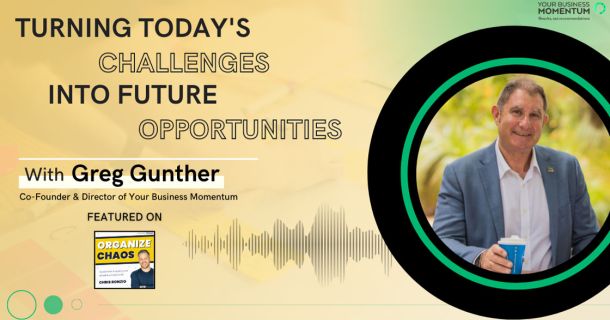How to Win More Referrals from Your Clients

Experience has demonstrated that your best clients will usually come as referrals from existing clients. These referrals are warm leads, and you have been given a trusted recommendation.
The more established your business, the greater the pool of existing and alumni clients you have to draw upon. Yet many organisations - even those with excellent Net Promoter Scores or Client Retention Rates - struggle to ask for and receive consistent, quality referrals. So how do you encourage more of these?
The Most Common Mistake
Remarkably, most business owners and sales people never ask for referrals! So that’s the most common mistake - and an easy one to avoid.
Even those who do ask often make the mistake of waiting too long. There are two points in your relationship where clients are most excited about working with you:
- in the month or so after they make their initial purchase, and
- Much later, when they have achieved the outcome they sought from your product or service.
Waiting six or twelve months for the client to achieve their full outcome is waiting too long. Your natural tendency may be to hold back, wait until the client has achieved some progress before asking, but this ignores the energetic journey your client is going through as they work with you or implement your product.
The best time to ask for referrals is when the client is still excited about making their decision.
It Starts at the Sales Meeting
Yes, your Client Referral Program starts when you first make the sale. No, I’m not suggesting you ask for referrals right then.
Hopefully, you have a consistent sales process that you and your team follow to convert leads into customers. At some point in this process - mine has a specific step dedicated to “Next Steps” - you will propose the pricing and engagement process your business offers.
At this step, I recommend planting the seed for future referrals. Try including something along these lines:
“I want to talk about our client referral program. Most of our best clients come from referrals from other clients who are happy with our work. At some future point when we have helped you, would it be OK for me to ask for possible referrals from you?”
Don’t let this stop the momentum of winning the sale. You’ll see it’s a soft question – you’re not asking for a referral, you’re just asking for permission to ask that in the future. Because of this, almost everyone will say ‘Yes’. Fantastic!
Follow-up
Use your experience over time – you want to follow-up this previous conversation at a time when the client is still excited about working with you, before they start taking you for granted. This timeframe will differ between, say, a consultant they see monthly and a new piece of software they use daily.
At that stage take the time (however this applies in your business model) to do a client check-in or review. Make sure they’re happy with your product or service, and that their expectations are being met. (Again, you would be amazed how many business owners don’t ask these questions and are then surprised when clients leave!)
If the feedback is positive, try your personal variation of the following steps:
“Can I ask, what is the most valuable thing you’ve received from working with us?”
"[Positive Response.]"
“Thank you. You may recall when we first met, I asked if it would be OK – once we had helped you – to ask you for some referrals. Our best clients come as referrals from our happy clients, and as a growing business they are so valuable to us. Who else do you know that I should talk with?”
Be Specific
In that example, I’ve been quite vague about the type of client you want to work with. In reality, you want to be specific about who your Ideal clients are – this not only ensures you are referred to ideal clients, it actually makes it easier for the client to think of a perfect match.
If I asked you to think of “five friends”, you may have to stop and think for a moment; but if I asked you to name “any friends with red hair” then your brain will often produce a faster response.
Similarly, asking “Who else do you know that I should talk with?” can be too vague. Better to ask for something specific, such as “We deliver the most value to female business owners with management staff, who are looking to increase revenue. Who do you know like that I should talk with?”
How do I refer to you?
You also want to make it as simple as possible for a client to give you a referral, and for you to pursue that opportunity. Sure, it would be lovely for a client to take time out of their day to call three of their relationships to recommend you, and force them to immediately call you; in reality, that additional friction usually blocks the referral from happening.
Much easier for the client to give you those three names, and permission to mention that ‘Bob Smith’ suggested I give you a call. This puts the responsibility in your hands, and makes it easier for everyone.
Another approach I quite like is the three-way email, where the client sends an introductory email to both you and the new prospect. Importantly, you want this to communicate your Brand Promise and also to put responsibility for the follow-up action onto you, not the other person.
Ask Quarterly
If you have ongoing clients, it’s important to have regular reviews with them to ensure they continue to feel valued.
And each of those is an opportunity to ask the referral question!
If your clients buy from you once or work with you for a year, and average one converted referral each, then this single channel to market will keep your revenue at its current level. Every other marketing channel you use would be adding clients and revenue on top.
If your clients worked with you for two years or more, and averaged just one converted referral across those four quarterly meetings? Then this single channel alone would double your revenue every single year.
Worth asking the question?!
Still Need More Referrals?
The challenge with Client Referrals in some businesses, especially younger companies, is that you don’t yet have too many clients who can give you a referral. This may also be the case if you have recently repositioned yourself in the market, or decided that your past clients aren’t the ideal clients you want moving forward.
An additional approach you could use is to take any good client (or any happy prospect, even if they haven’t purchased your product at this time) and chunk up a level.
Instead of asking them for direct referrals, find out who their trusted advisors are … then use that introduction to go and build relationships with advisors who work with lots of people in your target market.
For B2B business models, this might include asking for an introduction to (or for their permission for you to use their name when introducing yourself to):
- Bank Manager
- Lawyer
- Accountant
- Bookkeeper
- Business Coach
- Insurance Broker
- Mortgage Broker
- Financial Planner
- Any other Service Providers they use and trust
It's unlikely that from one client you're going to get a perfect list of all of those different people, but if you or your sales team are struggling to achieve meeting targets and aren’t sure who to go and talk to then go and have a chat to one client.
Ask them a half a dozen questions, and the next thing you know you'll have activity, your diary will be booked, and the referrals that come from that will flow.
This post is a tailored extract from The Start-up Business Guide, by Jacob Aldridge and Shan Naqvi. Available in Paperback, Kindle, and eBook at www.TheStartupBusinessGuide.com
About the Author
-

Jacob Aldrige
As an international business advisor and Keynote Speaker, Jacob delivers results for active growth companies in Australia, Asia-Pacific, Europe, and North America. Deeply intelligent with a keen eye for the off-kilter and slightly absurd, Jacob’s insight invites you to consider how business can be done if you avoid outdated assumptions, embrace the new, and create new paradigms on your pathway to success. Entertaining with an easy conversational style, a sharp wit, and brilliant humour, Jacob has the uncanny knack of distilling complex concepts into simple soundbites and powerful strategies that founders, executives, and team members both love … and execute.You may contact him at This email address is being protected from spambots. You need JavaScript enabled to view it. or through his website at www.jacobaldridge.com.
Running a business can feel overwhelming, but it doesn’t
have to be.
Related Blogs

Why Not Using A Marketing Strategy Could Be Costing Your Business Money

Government Grants To Support Australian Businesses
